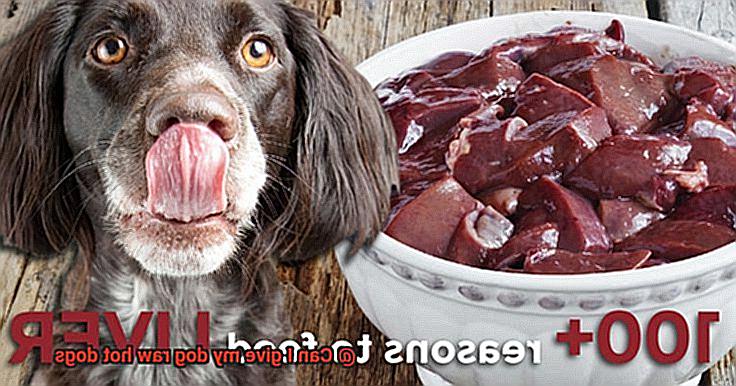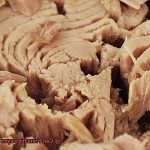Can I give my dog raw hot dogs?
The irresistible allure of a hot dog. Whether it’s sizzling on the grill at a summer cookout or being devoured at a baseball game, these tasty treats have a way of capturing our hearts (and stomachs). As a proud dog owner, it’s only natural to wonder if your furry friend can join in on the hot dog fun. I mean, they practically drool at the mere whiff of one.
But before you start tossing raw hot dogs to your pup like tennis balls, let’s take a moment to fetch some facts. Feeding dogs raw hot dogs is a topic that sparks debate among pet owners and experts alike. Today, we’re diving deep into the pros and cons of sharing an uncooked frankfurter with Fido.
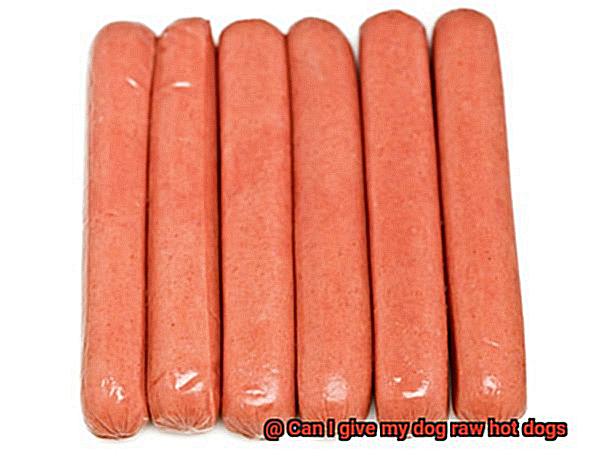
Sure, it might be tempting to give your dog an easy and delicious treat by simply handing them a raw hot dog. However, it’s important to remember that dogs have different dietary needs than us humans. Some argue that raw hot dogs can be an occasional indulgence for our four-legged pals, while others strongly advise against it due to potential risks associated with feeding them uncooked processed meats.
So, let’s embark on this culinary adventure together as we explore the potential benefits and drawbacks of serving up this popular human delight to our canine companions. By considering both sides of the bone, you’ll be equipped with all the information you need to make an informed decision about whether raw hot dogs should make their way into your dog’s bowl.
The Potential Dangers of Feeding Raw Hot Dogs to Dogs
Contents
- 1 The Potential Dangers of Feeding Raw Hot Dogs to Dogs
- 2 The Benefits of Commercially Prepared Dog Food
- 3 Other Healthy Treats and Snacks for Dogs
- 4 Veterinary Advice on Feeding Your Dog Raw Hot Dogs
- 5 Understanding the Nutritional Needs of Your Dog
- 6 How to Balance the Diet of Your French Bulldog
- 6.1 The Risks of Feeding Raw Hot Dogs:
- 6.2 Alternatives to Raw Hot Dogs:
- 6.3 Commercially Prepared Dog Treats: Look for commercially available dog treats made with natural ingredients and specifically formulated for canine consumption. These treats are designed to provide balanced nutrition while also satisfying your dog’s taste buds.
- 6.4 Consulting with a Professional:
- 7 Tips for Avoiding Bacterial Contamination with Raw Hot Dogs
- 8 Alternatives to Feeding Your Dog Raw Hot Dogs
- 9 Conclusion
Today, we’re going to tackle a hot topic in the doggy world – raw hot dogs. You may be wondering, “Can I give my Frenchie raw hot dogs?” Well, buckle up because we’re about to dive into the potential dangers that lurk behind those delicious-looking treats.
Bacterial Contamination:
Picture this: you’re at a backyard BBQ, and your Frenchie is wagging their tail, hoping for a bite of that juicy hot dog. But hold on. Raw hot dogs can harbor harmful bacteria like Salmonella and E. coli. These little buggers can wreak havoc on your pup’s tummy, causing severe gastrointestinal issues.
Sodium Overload:
Now let’s talk about salt, my friends. Hot dogs are often packed with sodium, which can lead to dehydration, kidney problems, and even salt poisoning in dogs. And trust me, you don’t want your Frenchie feeling as salty as a pretzel.
Additives and Preservatives:
Nitrates and nitrites may sound like something out of a chemistry lab, but they’re actually commonly used in hot dogs as preservatives. While their impact on our furry friends isn’t fully understood yet, these additives have been linked to an increased risk of cancer in humans. Let’s not take any chances with our beloved Frenchies, shall we?
Choking Hazards:
French Bulldogs are known for their adorable smushed faces and compact bodies, but these qualities also make them susceptible to choking hazards. Hot dogs’ cylindrical shape and smooth surface can easily become lodged in their airways or digestive tracts. Let’s keep those airways clear and those tails wagging.
Nutritional Imbalances:
French Bulldogs need a well-rounded diet just like any other furry companion. Hot dogs alone do not provide the necessary nutrients for their overall health. Relying on them as a primary food source can lead to deficiencies or excesses of important nutrients. Let’s make sure our Frenchies get the balanced diet they deserve.
Conclusion:
So, French Bulldog owners, it’s time to put those raw hot dogs back in the fridge and opt for safer alternatives. Your Frenchie’s health and well-being should always be a top priority. Consult with your veterinarian or a canine nutritionist to ensure your pup is getting all the necessary nutrients through a balanced, commercially prepared dog food that suits their breed, age, and health condition.
Remember, a healthy Frenchie is a happy Frenchie. Treat them to fresh fruits and veggies or explore the world of dog-friendly treats specifically formulated for their delicate tummies.
The Benefits of Commercially Prepared Dog Food
If you’re looking for the best way to keep your furry friend healthy and happy, then you’ve come to the right place. In this blog post, we’re going to dive into the pawsome benefits of feeding your French Bulldog commercially prepared dog food. So, let’s wag our tails and get started.
Balanced and Complete Nutrition:
Commercially prepared dog food is specially formulated to meet the nutritional needs of dogs at different life stages. It ensures that your French Bulldog gets the pawfect balance of proteins, carbohydrates, fats, vitamins, and minerals. No more worrying about whether your homemade meals are providing all the essential nutrients.
Backed by Science:
Dog food manufacturers invest in research and development to create high-quality products. They have a team of veterinary nutritionists who work their tails off to make sure the food meets the highest standards. Plus, they conduct feeding trials to ensure that their products are safe and effective for our furry friends.
Quality Control:
When it comes to our precious Frenchies, we want nothing but the best. Commercial dog food undergoes strict quality control measures to ensure it is free from any contaminants. This helps prevent any bacterial or parasitic infections that can occur from feeding raw or improperly prepared food.
Convenience:
Let’s face it; life can be ruff sometimes. But feeding your French Bulldog doesn’t have to be. Commercial dog food comes in various forms – dry kibble, wet canned food, and even dehydrated or freeze-dried options. These products have longer shelf lives and can be easily portioned out for each meal. Talk about convenience.
Specific Dietary Needs:
Just like us humans, French Bulldogs can have specific dietary needs or health conditions. The great news is that there are commercially prepared dog foods designed just for them. Whether your Frenchie is a puppy, a senior dog, or has allergies or medical conditions, you can find a dog food that meets their unique needs.
Added Nutrients:
Commercial dog food often includes added supplements that support your Frenchie’s overall health. These supplements, like omega-3 fatty acids and glucosamine, help with joint health, skin and coat condition, and more. It’s like giving your furry friend a little extra boost.
Nutritional Balance:
Feeding your French Bulldog commercially prepared dog food helps prevent nutritional deficiencies or imbalances. Homemade or raw diets can be challenging to balance correctly, and it’s easy to miss out on essential nutrients. But with commercial dog food, you can rest assured knowing that your Frenchie is getting all the nutrients they need.
Other Healthy Treats and Snacks for Dogs
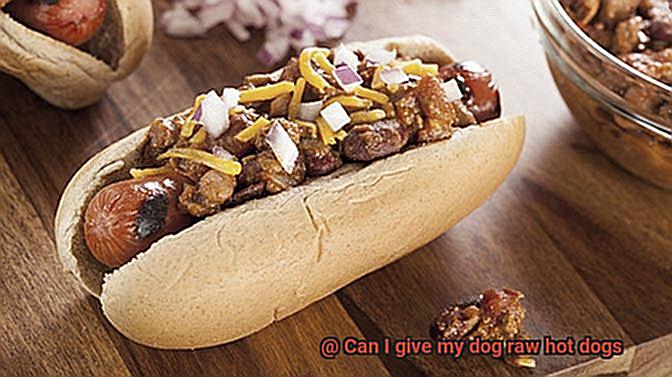
Our furry friends deserve the best when it comes to treats and snacks. Whether you’re looking to reward good behavior or simply want to spoil your French Bulldog, there are plenty of healthy options to consider. Let’s dive into some alternative treats and snacks that are safe and beneficial for dogs.
- Carrots: Crunchy and delicious, carrots make an excellent low-calorie snack for our French Bulldogs. Not only are they packed with vitamins, minerals, and fiber, but they also promote dental health by reducing plaque buildup. Plus, the beta-carotene in carrots is essential for maintaining good eyesight.
- Blueberries: These tiny powerhouses are a superfood for both humans and dogs. Loaded with antioxidants, vitamins C and K, and fiber, blueberries offer a wide range of health benefits. They can boost the immune system, support brain function, and keep your French Bulldog’s heart healthy. Just remember to serve them in moderation as too many can upset their stomach.
- Peanut Butter: Ah, the classic favorite. French Bulldogs absolutely adore peanut butter. It’s important to choose natural peanut butter without any added sugars or xylitol, as these can be harmful to dogs. Peanut butter is a great source of protein and healthy fats, which provide energy and support overall well-being. You can use it as a stuffing for Kong toys or simply give it as a tasty reward during training sessions.
- Sweet Potatoes: These orange wonders are packed with vitamins A, C, and B6, as well as dietary fiber. They’re low in fat and contain antioxidants that support a healthy immune system. You can bake or steam sweet potatoes and serve them as a standalone treat or mix them with other dog-friendly ingredients for a homemade snack.
- Green Beans: If your French Bulldog needs to shed a few pounds or maintain a healthy weight, green beans are a fantastic option. These crunchy veggies are low in calories and high in fiber, providing a sense of fullness without unnecessary calories. They’re also rich in vitamins A, C, and K, as well as manganese, which supports bone health.
- Yogurt: Plain, unsweetened yogurt can be a delicious and nutritious treat for French Bulldogs. It contains beneficial probiotics that support digestive health and can help alleviate gastrointestinal issues. However, be sure to check if your pup is lactose intolerant before introducing yogurt into their diet. Start with small amounts and monitor their reaction.

Veterinary Advice on Feeding Your Dog Raw Hot Dogs
As much as we love spoiling our French Bulldogs with treats, it’s important to remember that not all human foods are safe for our furry friends. Raw hot dogs, in particular, can pose risks to their health. In this article, we’ll explore why it’s crucial to consult your veterinarian before feeding your French Bulldog raw hot dogs.
Potential Bacterial Contamination:
Raw hot dogs can harbor harmful bacteria such as Salmonella or E. coli. These bacteria can cause serious food poisoning in dogs and may also be transmitted to humans. By feeding raw hot dogs to your French Bulldog, you put both their health and yours at risk.
Additives and Preservatives:
Hot dogs are often processed and contain additives, preservatives, and fillers that are unhealthy for dogs. These ingredients can lead to digestive issues, allergies, or other health problems in our French Bulldogs. It’s important to prioritize their well-being by choosing healthier options for their diet.
Choking and Gastrointestinal Blockages:
The cylindrical shape of hot dogs increases the risk of choking or gastrointestinal blockages in French Bulldogs. Their small size and short snouts make them especially susceptible to these dangers. Avoid potential emergencies by opting for safer food choices that won’t put their lives at risk.
Personalized Veterinary Advice:
Every French Bulldog is unique, with specific dietary requirements and health conditions. By consulting your veterinarian, you can receive personalized advice tailored to your furry friend’s needs. They will be able to recommend alternative options that are both safe and nutritious for your French Bulldog.
Conclusion:
Feeding your French Bulldog raw hot dogs is not recommended due to the potential risks involved. Consulting your veterinarian before introducing any new food into your dog’s diet is crucial for their well-being. Remember, a balanced and nutritious diet is essential for your French Bulldog’s overall health. Opt for high-quality commercial dog food that meets their nutritional needs instead of relying on processed human foods like hot dogs. Your furry friend will thank you for making their health a priority.
Understanding the Nutritional Needs of Your Dog
As a proud owner of a French Bulldog, it is essential to understand the nutritional needs of your furry friend to ensure they stay healthy and thrive. Providing a balanced diet that meets their specific requirements is key to their overall well-being. In this article, we will explore the nutritional needs of French Bulldogs and how to meet them.
Proteins: Building Blocks for Strong Muscles
Proteins are crucial for French Bulldogs as they provide the necessary amino acids for muscle growth, repair, and maintenance. High-quality animal-based proteins such as chicken, beef, or fish should be the primary source in their diet. Look for dog food formulas that list a named meat source as the first ingredient.
Carbohydrates: Energy for Playful Bulldogs
Carbohydrates serve as a source of energy for your French Bulldog. Opt for whole grains like brown rice or oatmeal, which provide fiber and nutrients. Vegetables and fruits are also excellent sources of carbohydrates and can be added to your Frenchie’s diet as healthy treats.
Fats: Healthy Skin and Shiny Coats
Fats are important for providing energy, supporting healthy skin and coat, and aiding in the absorption of fat-soluble vitamins. Look for dog food formulas that contain moderate levels of healthy fats from sources like chicken fat or fish oil. These fats not only provide essential nutrients but also make mealtime more enjoyable for your furry friend.
Vitamins and Minerals: Supporting Overall Health
Vitamins and minerals are essential for various bodily functions in French Bulldogs. They help maintain a strong immune system, promote proper bone development, aid in digestion, and support overall health. A high-quality commercial dog food formulated to meet the specific life stage of your Frenchie (puppy, adult, or senior) will typically contain adequate amounts of these essential nutrients.
Tailoring Nutrition to Individual Needs
It’s important to consider that different French Bulldogs may have slightly different nutritional requirements based on factors such as age, activity level, and underlying health conditions. Consulting with a veterinarian or a veterinary nutritionist is recommended to ensure that your Frenchie’s diet meets their individual needs.
Choosing the Right Dog Food
Feeding your French Bulldog a well-balanced commercial dog food that is formulated to meet their specific life stage is generally the easiest way to provide them with the necessary nutrients. When selecting dog food, read the label carefully to ensure it meets the nutritional standards set by regulatory bodies like the Association of American Feed Control Officials (AAFCO).
Homemade Diets: Proceed with Caution
While homemade diets can be an option, they require careful planning and supervision from a veterinary professional to ensure they meet your French Bulldog’s nutritional needs. It’s crucial to strike a balance between different food groups and consult with a professional who can guide you through this process.
How to Balance the Diet of Your French Bulldog
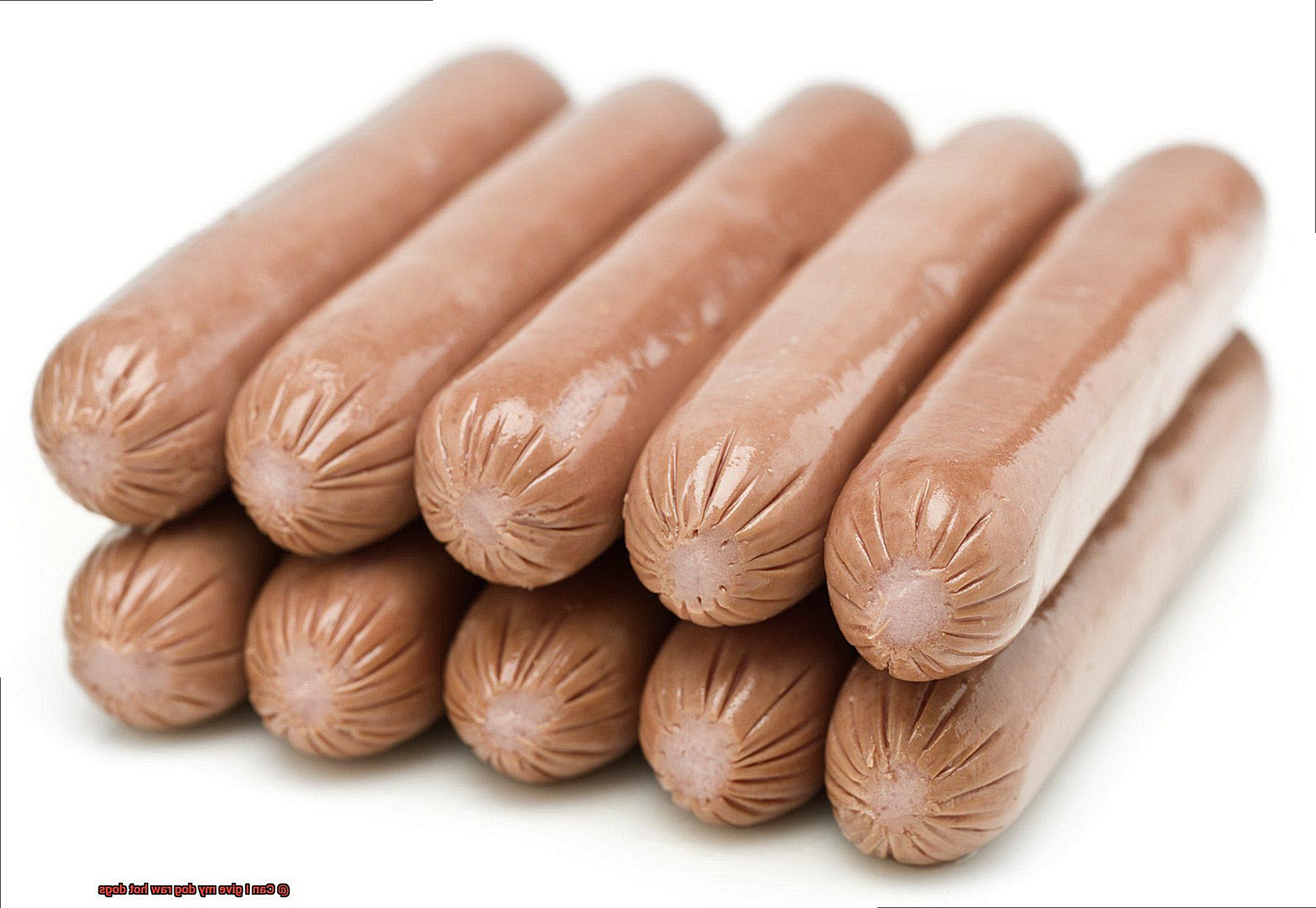
As a responsible dog owner, it’s important to be mindful of what you feed your furry friend. While it may be tempting to share your favorite foods with your French Bulldog, certain human foods can be harmful to dogs. One common question that arises is whether it’s safe to give your dog raw hot dogs. In this article, we will explore the potential risks associated with feeding your dog raw hot dogs and provide alternative options that are both safe and healthy.
The Risks of Feeding Raw Hot Dogs:
Raw hot dogs are typically made from processed meats and contain additives that can be harmful to dogs. These additives, along with high levels of sodium and preservatives, can negatively impact your dog’s health. Additionally, raw hot dogs can pose a risk of bacterial contamination, such as Salmonella or E. coli, which can cause digestive upset and other health issues in dogs. Feeding raw hot dogs regularly can also contribute to weight gain and increase the risk of conditions like pancreatitis due to their high fat content.
Alternatives to Raw Hot Dogs:
Instead of feeding your French Bulldog raw hot dogs, there are plenty of safe and healthy alternatives that you can offer as treats or snacks:
- Fresh Fruits and Vegetables: Many fruits and vegetables are safe for dogs and can provide essential vitamins and minerals. Carrots, apple slices (without seeds), and blueberries are all great options that most dogs enjoy.
-
Commercially Prepared Dog Treats: Look for commercially available dog treats made with natural ingredients and specifically formulated for canine consumption. These treats are designed to provide balanced nutrition while also satisfying your dog’s taste buds.
- Homemade Dog Treats: If you enjoy baking, consider making homemade dog treats using dog-friendly ingredients like peanut butter, pumpkin puree, or oats. There are countless dog treat recipes available online that are both safe and delicious.
Consulting with a Professional:
It’s always a good idea to consult with your veterinarian or a canine nutritionist before making any significant changes to your dog’s diet. They can provide guidance on the appropriate balance of nutrients and help ensure that your dog’s nutritional needs are being met. They can also recommend specific treats or snacks that are suitable for your French Bulldog based on their individual needs.
Tips for Avoiding Bacterial Contamination with Raw Hot Dogs
As a dog lover, you want to give your furry friend the best, but when it comes to raw hot dogs, caution is key. While dogs may be known for their love of all things meaty, raw hot dogs can pose risks to their health.
In this article, we’ll explore why raw hot dogs may not be the best choice for your pup and provide tips on how to keep them safe from bacterial contamination. Let’s dive in.
The Dangers of Raw Hot Dogs:
Raw hot dogs can harbor harmful bacteria like Salmonella and E. coli. These bacteria can cause serious illness in both dogs and humans. Additionally, hot dogs are often made from processed meats that contain high levels of sodium, preservatives, and additives that can be harmful to dogs in large quantities.
Prioritize Food Safety:
To avoid bacterial contamination when handling and feeding raw hot dogs to your dog, always handle them with care. Wash your hands thoroughly before and after touching raw hot dogs, as well as any utensils or surfaces that come into contact with them.
Store and Thaw Properly:
Store raw hot dogs in the refrigerator at a temperature below 40°F (4°C) until you are ready to cook them. Thaw frozen hot dogs safely by allowing them to thaw in the refrigerator overnight. This slow process ensures that the hot dogs stay at a safe temperature throughout, minimizing the risk of bacterial growth.
Cook Thoroughly:
Cook raw hot dogs thoroughly before feeding them to your dog. Ensure they reach an internal temperature of at least 165°F (74°C) to kill harmful bacteria. Avoid giving your dog any uncooked or undercooked hot dogs, as these can pose a risk of bacterial contamination.
Prevent Cross-Contamination:
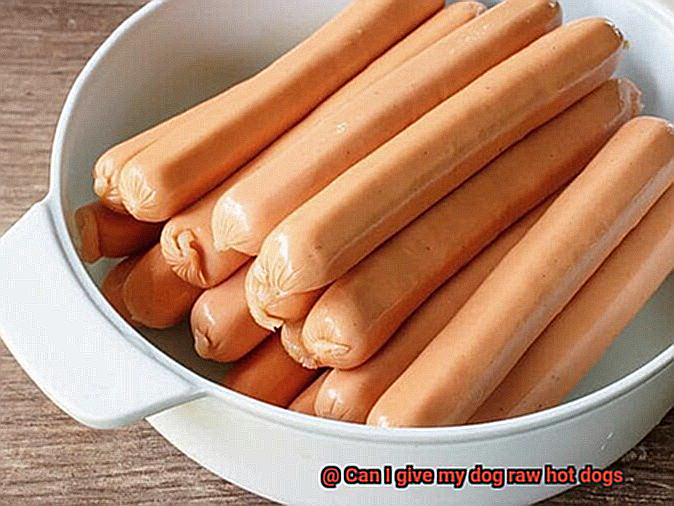
Use separate cutting boards, knives, and utensils for raw hot dogs and other foods to avoid cross-contamination. This helps prevent the spread of bacteria to other ingredients or surfaces that are not meant to be cooked.
Safe Alternatives:
While raw hot dogs may not be the best choice for your dog, there are plenty of safe and healthy alternatives. Consider giving your dog fresh fruits and vegetables or look for commercially available dog treats made with natural ingredients. Always consult with a veterinarian or canine nutritionist for guidance on the best diet for your dog’s breed, age, and health condition.
Alternatives to Feeding Your Dog Raw Hot Dogs
While raw hot dogs may be tempting, they can pose potential health risks for your furry friend. Don’t worry though, we’ve got you covered with some delicious and nutritious alternatives that will keep your French Bulldog happy and healthy.
Cooked Hot Dogs in Moderation:
If you still want to treat your French Bulldog to hot dogs, it’s best to cook them thoroughly. Boiling or grilling the hot dogs can eliminate harmful bacteria and make them safer for consumption. Remember, moderation is key, as hot dogs are high in sodium and may contain additives that aren’t ideal for your pup’s health.
Lean Meats:
Swap out raw hot dogs with lean meats like chicken, turkey, or beef. These proteins are packed with essential nutrients and can be cooked and cut into small, bite-sized pieces. Your French Bulldog will love the taste and benefit from the added protein.
Fresh Vegetables:
Don’t forget about the power of veggies. Steamed or boiled vegetables like carrots, green beans, or sweet potatoes make excellent and healthy snack options for your French Bulldog. Dice them into small portions to make them easier to chew and digest.
Commercial Treats:
If you prefer the convenience of store-bought treats, look for options specifically formulated for dogs. Choose treats made from high-quality ingredients and free from artificial flavors, colors, and excessive fillers. Protein-rich treats without any harmful additives are a great choice to keep your French Bulldog satisfied.
Raw Food Diets (with caution):
Raw food diets have gained popularity among some dog owners. However, it’s crucial to consult with a veterinarian before making any dietary changes. A raw food diet may not provide all the necessary nutrients your French Bulldog needs, and there is a risk of bacterial contamination if not handled properly.
8PqRcUkYkQk” >
Conclusion
In conclusion, it is not recommended to give your dog raw hot dogs. These processed sausages are typically high in sodium, preservatives, and additives that can be harmful to your furry friend. Feeding them raw hot dogs regularly can lead to digestive issues, obesity, and even pancreatitis.
Instead, opt for healthier alternatives that are specifically designed for canine consumption. There are plenty of nutritious dog treats available on the market that provide a balance of protein and other essential nutrients without the potential risks associated with raw hot dogs.
Remember, your dog’s health and well-being should always be a top priority. Consult with your veterinarian if you have any concerns or questions about what foods are safe for your pet. They can provide personalized advice based on your dog’s specific needs and dietary requirements.
